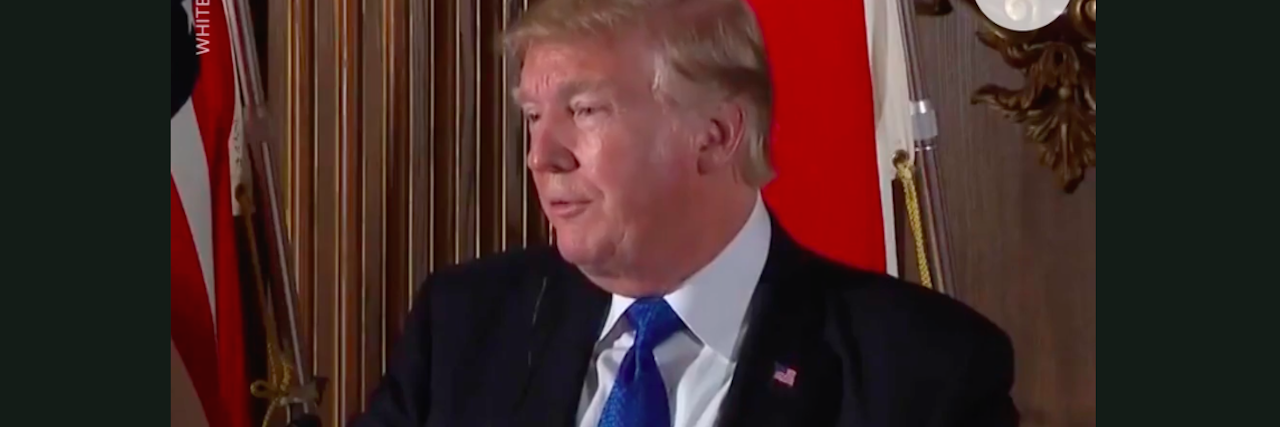President Trump Says 'Mental Health Is the Problem' After Texas Shooting
On Monday, one day after the most recent U.S. mass shooting at a church in Sutherland Springs, TX, President Trump spoke at a news conference claiming that mental health — not guns — was the real “problem” behind the shooting, which claimed at least 26 lives Sunday morning.
Speaking from Tokyo, the president called Devin Patrick Kelley, who has since been identified as the shooter, “a very deranged individual.” He said:
I think mental health is your problem here. This was a very — based on preliminary reports — a very deranged individual, a lot of problems over a long period of time. We have a lot of mental health problems in our country, as do other countries. But this isn’t a guns situation, I mean, we could go into it, but it’s a little bit soon to go into it. But fortunately someone else had a gun that was shooting in the opposite direction, and otherwise it wouldn’t have been as bad as it was, it would have been much worse. But this is a mental health problem at the highest level.
It has not been reported whether Kelley had been diagnosed with a mental illness. From the little we know, he was a 26-year-old former U.S. Air Force airman who spent a year in military prison after assaulting his wife and child in 2012. In 2014, he was reduced in rank and released from the military with a bad conduct discharge. In 2016, he purchased a Ruger AR-556, an assault-style rifle, from an Academy Sports & Outdoors store in San Antonio. This was the weapon used in Sunday’s shooting, CNN reported..
Although less than 3 to 5 percent of U.S. crimes involve people with mental illness, it has been found that factors like a history of violent victimization early in life, substance abuse and exposure to violence can be important risk factors. Dr. Jeffrey Swanson, a professor of psychiatry and behavioral sciences at the Duke University School of Medicine and one of the leading researchers on mental health and violence, once told ProPublica:
We did a study some years ago, looking at [violence risk] among people with serious mental illness. The three risk factors we found were most important: first, a history of violent victimization early in life, second, substance abuse, and the third is exposure to violence in the environment around you. People who had none of those risk factors ― even with bipolar disorder and schizophrenia ― had very low rates of violent behavior.
Some criticized Trump for his response, comparing it to how he reacted when a 29-year-old man from Uzbekistan drove into a busy bicycle path in Manhattan, killing eight.
Donald Trump last week: New York attack suspect should get death sentence.
Trump today: Texas church massacre a “mental health problem”.— Aisha S Gani (@aishagani) November 6, 2017
“Are you gonna do anything about guns?”
TRUMP: No, it’s about mental health
“Are you gonna do anything about mental health?”
TRUMP: No
— Todd ‘Papi’ Carlos (@TheToddWilliams) November 6, 2017
The American Psychological Association released a statement from its president, Antonio E. Puente, PhD, countering Trump’s claims:
The vast majority of people with mental illness are not violent. A complex combination of risk factors, including a history of domestic violence, violent misdemeanor crimes and substance use disorders, increases the likelihood of people using a firearm against themselves or others.
Firearm prohibitions for these high-risk groups have been shown to reduce gun violence. The suspect in this case, Devin Patrick Kelley, exhibited several of these red flags.
Gun violence is a serious public health problem that requires attention to these risk factors, as well as more research to inform the development and implementation of empirically based prevention and threat assessment strategies. Calling this shooting a ‘mental health problem’ distracts our nation’s leaders from developing policies and legislation that would focus on preventing gun violence through a scientific, public health approach.
What do you think about the President’s comments?

